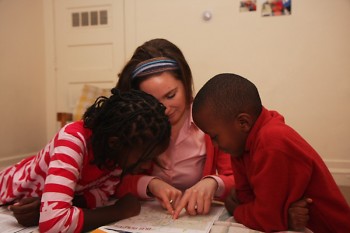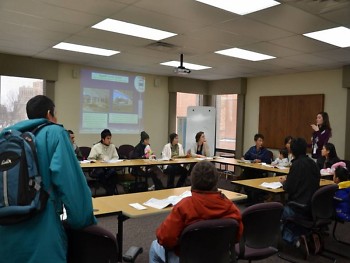According to the UNHCR’s 2011 statistics, the estimated total number of refugees around the world is 15,600,000. According to the US bureau of Population, Refugees and Migration, since 1975, the US has welcomed over 3 million refugees from all over the world. In 2012, the US accepted the greatest number of people through resettlement when compared with other countries, according to the UNHCR’s global appeal update.
The 1951 Refugee Convention that established UNHCR defines a refugee as someone who "owing to a well-founded fear of being persecuted for reasons of race, religion, nationality, membership of a particular social group or political opinion, is outside the country of his nationality, and is unable to, or owing to such fear, is unwilling to avail himself of the protection of that country."
How do refugees get to the US?
The journey of a refugee -to eventually settle in a new host country -starts years before the travel day. It begins in the refugee’s homeland. Persecuted because of religious beliefs, ethnic background or political affiliations and feeling totally menaced and insecure, refugees cross the border while dodging guards and bullets. Those who manage to flee head to the nearest refugee camp to settle there for a period of time until a new country accepts to receive them.
Bahr Eddine, a 19-year old Sudanese refugee who just arrived to the US two months ago from the Choucha Camp located at the Tunisian-Libyan border, describes the way he proceeded to apply for a refugee status.
“There was a desk in the middle of the camp, a big tent with the UNHCR banner. People were going back and forth talking about refugee application. Some of my friends encouraged me to go and register my contact details. Few weeks later, I was invited for an interview,” he says.
All applicants get to be interviewed by the UNHCR agents. Those who may be headed to the US have to be also interviewed by the US Immigration and Naturalization Service (INS). The interview is meant to inquire into the applicants’ individual situations. Only those who succeed to prove that their lives may be put at stake would get their cases processed.
“My wait was not lengthy at all. Four weeks later, they informed me that I was approved for admission and that I was expected to travel to the US soon. A new life was ahead,” he says.
After undergoing security and health screenings, refugees like Bahr Eddine enter the US Refugee admission program that is annually mandated by Congress. After receiving their admission news, the International Organization for Migration (IOM) arranges travel from the refugee camp to the US.
Arrival to the US
The US has nine domestic refugee resettlement agencies that provide a basic group of services during the refugee’s first 90 days in the US. The Lutheran Social Services of Michigan Refugee Services is one of the “voluntary” agencies that help refugees resettle in Michigan. Starting a new life is a real challenge that requires a lot of patience, courage and faith in the future. Starting over also requires a lot of assistance and help. Most refugees arrive in the US with a few small bags of their personal possessions. After enduring persecution and surviving the trauma of hunger and the loss of friends and family members, refugees find themselves in a great need of the help of organizations and individuals.
The Resettlement Process
Voluntary agencies like the Lutheran Social Services of Michigan (LSSM) have a dedicated and competent staff working on assisting refugees in the first few months of their resettlement in the US. The staff is comprised of a number of international case workers, each is taking care of a number of cases. The case worker is the most direct contact for the refugee with the organization. From the day of the arrival to the last days of the resettlement program, the refugee develops a relationship with the case worker.
Oman is a case worker who has been working with LSSM for quite a long time. He is mostly assisting Bhutanese refugees since he is originally from Bhutan. He briefly described the set of tasks he has to undertake with a typical case.
“The process starts with the airport pickup and then we take the clients to their apartments which had been already furnished," he says. "Before the arrival of the clients, we also purchase some of the food typical to the refugee’s culture so that he/she can prepare food in the first days after their arrival." Oman continued describing the rest of the process. "Another service that is provided to our clients in the first week is helping them apply for a social security number Medicaid and food stamps,” he says.
Counseling is another service that some of the resettlement agencies are able to provide. Bethany Christian Services is another affiliate based in Michigan that has a counseling program for victims of torture and/or trauma. Dona Abbot, Bethany’s refugee services director, describes the importance of this service especially for clients who endured physical torture.
“Many are surprised, concerned and disappointed to find that though they are physically safe, they and their families continue to deal with the aftermath of the traumas they have experienced," says Abbot. "Many suffer the symptoms of trauma including nightmares, flashbacks, head and stomach aches, anxiety and depression.”
Usually, it takes up to two months for refugees to get oriented to the new area where they are expected to live for at least six months. In order to make this adjustment process happen, resettlement agencies like Lutheran Social Services and Bethany Christian Services provide basic training like cultural adjustment sessions, bus training and job search workshops.
The job quest needs to start at the earliest convenience. As soon as refugees receive employment authorization, they are encouraged to start the job hunting process.
“Self-sufficiency means having a job,” says Maan Mang, a 32-year caseworker who originally came from Burma. Yet, helping clients find an appropriate job is one of the main challenges that LSSM faces on a daily basis.
“We usually tell them what to expect, we encourage them to take whatever job they are offered but we never force them,” Oman says.
“Most refugees begin in entry-level jobs, even if they have high-level skills or education,” according to the US Department Bureau of Population, Refugees and Migration. They are also encouraged to continue taking English classes in order to function more comfortably in the US and optimize as much as they can their future professional career.
Oman thinks that due to the growing challenges that the job market in Michigan is enduring, helping his clients find a job has become a harder process.
"I request the local companies to give a chance to refugee status holders," he says. "They are really hard working people and they do need a job to become self-sufficient.”
Abbot thinks that English literacy can be a huge obstacle for refugee job-seekers.
“It is difficult to find employment for refugees who do not speak English and the majority of whom do not have easily transferable job skills,” she says.
Challenges and the role of Volunteers
Resettlement agencies like LSSM are usually given a very large task to fulfill. In order to achieve their goals in the best way they can, support from the local community is increasingly needed. Jennifer Spears is LSSM’s outreach and volunteer coordinator. She is in charge of recruiting volunteers and building partnerships with the surrounding community.
“We cannot care for families in the way that we desire without the assistance of friends and neighbours, volunteers can develop a different type of relationship with a family than can a caseworker,” says Spears.
LSSM currently has 23 active individual volunteers that are meeting once a week with a family. “We have active partnerships with about 15 churches. Some consistently donate, others co-sponsor families and others facilitate things like English classes. We are so thankful for these partnerships and we need more like them,” Spears says.
No matter how smooth and easy the resettlement process might go, challenges are still likely to arise throughout. Alice Gallmeyer, LSSM’s senior refugee specialist, thinks that the greatest challenge for LSSM staff is helping clients to shift their mindset.
“The orientation they go through overseas and what they hear from other refugees have a way of painting a picture which does not always reflect the real logistics of the resettlement process,” she says.
Spears says that volunteer retention is also a great challenge in her position.
“We ask for a three month commitment so that it is reasonable. But it is great to have volunteers 're-up' because they have already gone through training, have the experience and the ability to gain more ground because they have some competence in working with refugees,” she says.
Another challenge is the language barrier that some of the volunteers go through during their time spent with some of the families. Michelle is a 24-old volunteer who was paired with a Congolese family a month ago. Michelle has been committed to visiting the family on weekly basis. “The language barrier was a huge obstacle at first but once I started teaching them some English, things got better. They are now able to replicate some casual daily phrases. A lot of people are scared of the language barrier but they should be patient and they should make their families learn English through them. I think learning English is the best way toward a successful cultural assimilation.”
Moreover, navigating public transportation in Michigan represents a great challenge to refugees who seem to struggle hard in order to attend job interviews, commute from work to home and even undertake their daily shopping needs.
“Learning to drive, obtaining a vehicle and financing car ownership pose an even greater challenge. Staff focus on bus orientations early on and work through the greater transportation conundrums with clients as the challenge of transportation arises,” says Gallmeyer.
Another important challenge that staff in these resettlement agencies face can be counted as a cultural obstacle. Interacting with different groups coming from diverse cultural and ethnic background can be somehow frustrating and challenging.
“Staff enjoy the diversity of cultures and languages that resettlement casework offers but it is a challenge to assure they understand the differences reflected in each refugee group so they can take the culture as well as their flight history in to consideration as they work with each adult to develop an individualized resettlement plan,” Abbot says.
Refugees are freedom-seekers. Their long journey from their homelands to the US comes to be certainly worthwhile when they find the support and help needed to make their future and the future of their children bright and promising.
The Rapidian, a program of the 501(c)3 nonprofit Community Media Center, relies on the community’s support to help cover the cost of training reporters and publishing content.
We need your help.
If each of our readers and content creators who values this community platform help support its creation and maintenance, The Rapidian can continue to educate and facilitate a conversation around issues for years to come.
Please support The Rapidian and make a contribution today.


